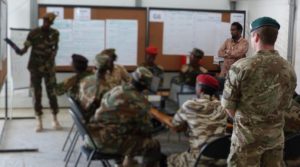
I recently joined the small team of British military advisors, currently deployed in Somalia to train, equip and advise the Somali National Army (SNA). It’s a fascinating job, with every day throwing up a completely new and unique set of challenges – no week is the same in this role. We do a wide range of work, driven by the SNA’s needs. Our objective is to build Somali army capacity to deliver greater operational effectiveness in the fight against Al Shabaab and in anticipation of Somali army managing its own security when the African Union troops here withdraw. In practice, this means offering training to the SNA (such as operations room planning and patrol base defense courses), equipment and supplies, mentoring and infrastructure.
Throughout, we try to identify gaps, to make sure our interventions are as useful, successful and cost-effective as possible. For instance, although the SNA were receiving lots of necessary equipment (e.g. vehicles), we saw that many of the individual soldiers lacked the kit necessary to live in the bush. The team therefore sourced uniforms, belts and water bottles for distribution, which were soon followed by tents and blankets. The same goes for our infrastructure projects, where we identify key gaps. One example of this was in Kismayo, where the SNA had no access to proper toilets and washing facilities – many soldiers were therefore unable to work due to illness. So the UK funded the construction of an ablutions block, which led to an almost immediate reduction in soldiers becoming sick and days being lost.
As a team, we need to be constantly collaborative and interactive. Not only with the SNA – consulting with them as to their needs and mentoring them (e.g. regularly keeping track of SNA students who have gone through training and continuing to offer guidance and support as they apply their newly learnt skills) – but also with the rest of the international community. We deliver many courses in partnership with other donors, as the mix of training providers offers the best value for money and helps go some way in ensuring the training to the SNA is more consistent across international donors.
We are making progress. For instance, one of our more recent successes is the roll-out of the new radio system across the country, allowing the SNA to communicate to their forces in the field, without relying on mobile phones as they had previously! Looking ahead to the next few weeks and months, we will be conducting further training (including on running operations rooms), improving the SNA facilities, and delivering key enablers.
Security and stability are the cornerstone of which we can build a Somalia that provides the peace and prosperity its people deserve. Working in Mogadishu, I have caught glimpses of what that secure and prosperous Somalia would look like, seeing shops open, busy streets full of people and the daily construction work as new buildings spring up around the city. This is not to underestimate the challenges that exist; rebuilding a country that has suffered so much will take the continued efforts of all Somalis. But the UK is committed to working in partnership with Somalia at this critical time. And I am pleased to be part of that effort to help Somalia to once again become a stable and vibrant country; rich in talent, energy and potential.
